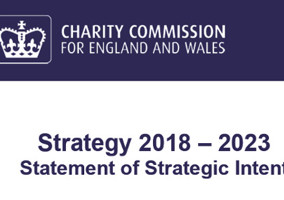Nearly a year ago, the hottest ticket in town was entry to the RSA to hear the Charity Commission’s chair, Baroness Stowell, unveil the regulator's new strategy.
The Commission, she promised, would provide better support for charities but at the same time would demand higher standards from those it regulates, and crucially would not hold back from calling out wrongdoing.
She said that the Commission would “offer more, and amount to more”. By this she meant it would both improve services for charities, but also become a better influencer within government as well as being more vocal.
At the time, however, Stowell said the whole sector shares a “collective responsibility” to meet public expectations of charity and avoid “being complicit in its decline”. “Charitable aims cannot justify uncharitable means,” she said.
Sarah Atkinson, director of policy and communications at the Commission, says this year’s focus has been on laying the foundations.
“Our new strategy came into force operationally from 1 April this year. As we made clear in our annual report, our priority during the first year of the strategy is to get the basics right, ensuring that we have the systems, structures and processes in place to manage demand on our core functions, while delivering the customer service that charities have a right to expect."
More practical support
During the revelations about safeguarding problems at Oxfam and other charities, one of the charges that was laid at the Commission’s door was that it had not taken concerns seriously or acted promptly on them.
In June, the Commission began a six-month pilot of a new whistleblowing line, operated by whistleblowing charity Protect, and funded by the Department for Digital, Culture, Media and Sport from its fund to improve safeguarding in the sector.
Another criticism from charities has been that it is difficult to speak to a human being at the Commission. Limited contact centre opening hours meant people had quite a short window in which to call, and that when they did they sometimes struggled to get through.
In the spring, the Commission began a three-month trial of extended opening hours, and has continued to operate for an extra two hours a day beyond this period.
Recruitment drive
For the first time since austerity imposed significant cuts on the Commission’s budget, the regulator has been on something of a recruitment drive. Its annual report says that 140 new employees have joined over the last year, with just 39 staff leaving.
Overall staff numbers have risen by around a third, from 305 in March 2018 to 410 in March 2019. This means it has increased its operations capacity by 37 per cent, its investigations capacity by 39 per cent, and its IT functions by 55 per cent.
It’s worth noting that the Commission’s own governance was also updated, in between the publication of the strategy and it coming into force, setting out how the board and executive directors should interact.
As well as appointing new board members, the Commission’s chief executive, Helen Stephenson, joined the board so that her role as accounting officer is represented at the highest level of corporate decision-making.
This brings the Commission into line with recommended governance practices of other similar bodies.
Delays to registration
But not all are experiencing a smoother service from the Commission.
Rosamund McCarthy, partner at the law firm Bates Wells, says that it is taking longer to successfully register new charities.
“At a strategic level the Commission does not appear to sufficiently prioritise registering charities,” she says. “We are finding that the average time to process a charity application is around six months (it used to be more like three months), with some taking considerably longer.”
This means that charity founders are more inclined to use unregulated crowdfunding platforms which “lack transparency and tax efficiency”.
McCarthy asks: “In terms of the delays in charity registration, has the Commission calculated the loss of gift aid to the sector, as well as the loss of public trust and accountability?”
The Commission’s annual report reveals that there has been a 41 per cent increase in organisations applying for charity status since 2012-13, when the charitable incorporated organisation structure was launched.
The report states: “We regret the delays some applicants experience because of the volumes we are handling and the rigour we must apply. Where we have been unable to make an early registration decision, we have improved our communications with applicants to make them aware of any hold-ups.”
The Commission promises that all applications are assessed within 48 hours of receipt, and those that have an exclusively charitable purpose and have demonstrated that they operate for the public benefit are registered immediately. Others make take longer.
A spokesperson for the Commission added: “Because charitable status carries such an important role in our society, we have to take our role as registrar extremely seriously. This is what the public and Parliament expect.
“We conduct a thorough and robust assessment of an organisation’s charitable status and public benefit before we make our decision on registration.”
Finding its voice
The Commission promised it would speak up more. And it is.
This has been most notable when publishing findings of statutory inquiries. Of late the regulator has taken the opportunity to raise wider points to government, charities and even highlight areas where its powers come up short.
When it published the findings of its investigation into the Garden Bridge Trust, although it found that the trustees had “fulfilled their legal duties”, there were some harsh words for public sector leaders about the folly of setting up charities to deliver infrastructure projects.
Similarly, when it published its inquiry report into Oxfam, the Commission used the opportunity to talk more broadly about safeguarding challenges faced by the sector.
More recently, as it published the findings from its inquiry into Bristol Sheltered Housing Accomodation and Support last week it warned of difficulties and lack of clarity around the regulation of the social housing sector and said it would be reaching out to politicians.
Tensions
But this rhetoric has not been well-received in some quarters. The Commission’s tone has been repeatedly criticised by those who feel it is being excessively critical, in a way which actually risks doing harm to the sector.
The principal accusation is that the Commission, particularly its chair, too often uses an example of bad practices in the sector to make sweeping generalisations. Following the publication of the Garden Bridge Trust report, Kristiana Wrixon, head of policy at ACEVO, wrote of how referring to one, unusual, organisation's failure as a “failure of charity” could tarnish the whole sector.
Reflecting on the year as a whole, Wrixon says: “ACEVO broadly welcomed the Charity Commission’s statement of strategic intent when it was released last year. However there has been a lack of subsequent detail and transparency about exactly what the Commission plans to do in the short and long-term.
“It was, and still is, concerning that the regulator has said that it views its purpose as ‘more than the sum of its legal obligations’. Over the last 12 months it has at times felt like the Commission is trying to make all of its actions fit one particular narrative on trust, which is itself damaging to public trust in charities and charities’ trust in the regulator.”
The Commission’s Oxfam inquiry report has also been condemned in the sector, both for the tone and language it used about the wider sector, and for being too harsh on Oxfam’s leadership.
Stowell’s article in the Times discussing the Oxfam report prompted Sir Stuart Etherington, then chief executive of NCVO, to write to the Commission expressing concern about the “direction of travel”.
While in an article for this website, Andrew Hind, a former chief executive of the Charity Commission, examined the regulator’s inquiry report into Oxfam, and concluded that its trustees and senior leadership could be seen to have taken appropriate steps and that such harsh criticism was unjustified.
“The way that they have been treated by the media and the regulator has sent shockwaves through the charity sector. This will have repercussions which extend way beyond Oxfam. Why, after the unjustified vilification of Oxfam’s trustees and senior staff, would similarly talented individuals be willing to fill such positions in UK charities in future?” he wrote.
Where next?
To my mind, the Commission has demonstrated willingness to put its strategy into action, and there are some positive developments. But it is limited as to what it can achieve within a short time-frame and with a limited budget. The positive elements have also been overshadowed by its focus on public trust and the frustration about the tone it uses to relay this message in the national media.
While the Commission did receive a reasonable boost to its budget in the recent spending round, demands on its resources continue to increase, so if it really wants to do more, what is really needed is a long-term settlement that could enable it to invest properly.
Perhaps if it had the resources to make bigger practical and tangible differences, then it would not need to resort to trotting out tired soundbites about public trust in order to meet its objectives.
The Commission is expected to provide an update at a public meeting today. We await what they say with interest.
Kirsty Weakley is editor of Civil Society News
|












